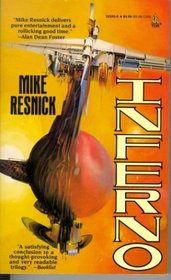Helpful Score: 1
Although this was presented as the final book of a trilogy, in fact all three books are stand-alone novels. Each presents the history of a different African country, as science fiction. So one could view them as a triptych, but not really a trilogy.
"Inferno" is based on the history of Uganda, from the time of the first Western explorers, up until the time of Resnick's writing (1993).
Although it is set on the planet of Faligor, which is populated by various tribes of golden-furred aliens, the allegory (which is stated up front) is very clear. A few events are simplified and conflated, but the history is Uganda's, and the events presented are what really happened. (yes, I looked up the history of Uganda on the web right after finishing the book!) Even the names of the aliens are faux-African, and at no point to they really act like aliens - they act as the all-too-human figures they were based on acted (which could be viewed as a failing, if you're judging the book as science fiction.)
That's the thing, I didn't really feel like it was science fiction, even though it had plenty of aliens, spaceships, laser guns, and etc... The writing was very basic, and throughout most of it, did read like history. The main characters were there to go through the events and comment on them - they didn't really come to life.
So, while I agreed with Resnick's points on the dangers of colonialism, and also feel like I've learned many more details than I did know about the atrocities that happened in Uganda, with the dictator Idi Amin, etc.. - and why they happened - I can't say this was truly a great book.
I did think it was worthwhile to read, however.
"Inferno" is based on the history of Uganda, from the time of the first Western explorers, up until the time of Resnick's writing (1993).
Although it is set on the planet of Faligor, which is populated by various tribes of golden-furred aliens, the allegory (which is stated up front) is very clear. A few events are simplified and conflated, but the history is Uganda's, and the events presented are what really happened. (yes, I looked up the history of Uganda on the web right after finishing the book!) Even the names of the aliens are faux-African, and at no point to they really act like aliens - they act as the all-too-human figures they were based on acted (which could be viewed as a failing, if you're judging the book as science fiction.)
That's the thing, I didn't really feel like it was science fiction, even though it had plenty of aliens, spaceships, laser guns, and etc... The writing was very basic, and throughout most of it, did read like history. The main characters were there to go through the events and comment on them - they didn't really come to life.
So, while I agreed with Resnick's points on the dangers of colonialism, and also feel like I've learned many more details than I did know about the atrocities that happened in Uganda, with the dictator Idi Amin, etc.. - and why they happened - I can't say this was truly a great book.
I did think it was worthwhile to read, however.




